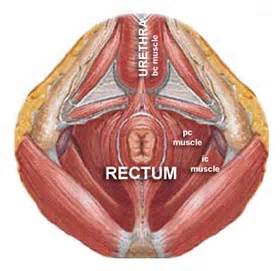 Welcome to the world, little one
Welcome to the world, little one
One of the first sexual interventions a parent makes for a child is the decision to circumcise or not. And, as with many future sexual interventions, the parents may not have the best or most accurate information. We have been seriously misinformed about the foreskin. Many of us grew up thinking it was an unimportant, inconsequential flap of skin. But, generally speaking, our bodies don’t work that way, right? Think about it – how many other body parts do we just figure we can do without?
The foreskin actually has several purposes. First it represents 25-50% of the skin of the penis and is full of nerve endings. The most sensitive nerve endings of the penis are in a ring on the inner foreskin which are stimulated by stretch and movement. The foreskin is a double layer skin system with the inner layer containing glands that produce fluid to keep the penis protected and slippery. The soft internal layer also provides some immune protection with plasma cells, which secrete antibodies, and pathogen-killing enzymes. The foreskin protects the sensitive head of the penis when it is unerect. Without the foreskin the skin of the penis toughens up a bit as it is exposed to more friction through daily life. The foreskin also maintains lubrication and decreases friction during penetrative intercourse by bunching at the opening of the vagina. This could also provide more stimulation of the vulva.
This may be unwelcome information to you, either because you have chosen to circumcise a child or because you yourself were circumcised. But I think it is important to have accurate information about our bodies, including all body parts. There has been confusing information about health risks associated with keeping the foreskin but even in the face of those questions not one world health association actually recommends routine circumcision. In America we are more familiar with the look of a circumcised penis, although that will be changing as our circumcision rates are dropping. The CDC reports that in 2009 68% of US baby boys were not circumcised. Globally the rate of boys left intact is 70 -80%. Religious considerations are a family’s to consider and weigh, but weight them with complete information in mind.
If you are a man who has been circumcised you may feel some grief or anger about this decision that was made for you before you could choose for yourself. You may feel sadness about the unknowns, what might have been with your foreskin intact. It is difficult to compare the experience of a man uncircumcised since birth with a man who was circumcised. The best response is to grieve as you need to and to love your body as it is today. Remember there is much joy and pleasure to be had as you explore what works for you and your body.
Welcome to the World, little one
 Less awkward with an app?
Less awkward with an app?
My generation came of age during the start of the AIDs crisis and we were taught to fear the consequences of STDs. We sat through school assemblies with spunky speakers in brightly colored oversize T-shirts who told us to ask our partners if they had been tested. They gave us scripts and role plays for asking a partner to wear a condom but little guidance about the conversation about STD testing. But hey, we were responsible kids, not slackers when it came to sex, a lot of us did ask partners for HIV tests and maybe for other STDs as well. But few of us found a way to be comfortable or casual about this conversation.
I just learned about a new app for exactly that conversation. Silly me, of course there’s an app for that! It’s a smart concept. Hula hosts and protects consumers STD information which can be downloaded from your healthcare provider to the site. It provides Yelp type reviews and contact info for testing facilities in your area. But the part that could change people’s dating experiences is that you can give someone a code to visit your profile and verify your STD status. So no more, “yeah, I got tested months ago, no worries”, no more wondering if someone really did get tested or how long ago. If you decide you want to take the step of being fluid bonded (sharing sexual fluids, not safe sex) with someone, you have an easy and effective way to responsibly take that step together.
My hope for something like this app is that it makes checking STD status a normal part of the sexual interaction and dating cycle. People dating now cannot deny the reality of STDs. The CDC estimates that nearly 20 million new sexually transmitted infections occur every year in this country, half among young people ages 15–24. It is a part of the sexual landscape and awareness is part of sexual responsibility. We need to find ways to make this less awkward, to normalize safer sex and the steps to take before deciding to share fluids. Can you imagine a time in which during the sexual buildup of a relationship or a hookup someone says, “U make me hot. txt me your STD profile. J”. Whether this sounds scary or sad or brilliant to you, it is a part of the modern dating reality. Anything we can do to make this conversation easier is important.
 Don't abstain for Aunt Flo's sake
Don't abstain for Aunt Flo's sake
Put two things that people rarely talk openly about together – sex and menstruation – and what do you get? A lot of myths, exaggerations, unexamined worries, and questions..and a lot of people not talking about what they are doing. Despite old cultural taboos about the nastiness of menstrual blood, a woman having her period is perfectly viable and healthy sexual partner. Some women suffer considerably while menstruating, for others it is a mild annoyance and they would be happy to engage in sex play during their bleeding time. An overview of all studies done on sexual desire and sexual activity levels and menstrual cycles (up to 1980) found mostly variations. Some studies found peaks at mid-cycle, some pre-menstrually, some during menstruation, post menstruation. (Schreiner-Engel, 1980). So once again, everyone is different. If you or your partner are one of the ones who feel desire during her period, not to worry, you get a thumbs up for all kinds of play.
Not only is sex during menstruation not bad for you, it may have some benefits. Orgasm can be a great way to relieve menstrual cramps and headaches, so that can be a good reason to invite a partner to play with you even while bleeding. Of course is you are feeling shy, orgasms from masturbation work just as well. A really interesting study (Meaddough et al, 2002) found that women who had sex and orgasms during their menstruation were less likely to develop endometriosis than women who rarely had sex during their period. This may have something to do with the uterus’ role during orgasm. Uterine contractions that happen during orgasm actually change direction based on the phase of the menstrual cycle. This is amazing to me. Mid-cycle when a woman is most fertile the uterine contractions pull semen up towards the uterus. But during menstruation the contractions serve to expel material out of the vagina. This can also cause your period to last fewer days as the blood gets expelled more quickly. I find this fascinating fact out in Mary Roach’s Bonk.
Fresh menstrual blood is a normal body fluid and is not going to hurt you. It is fine to get it on thighs, penises, hands, etc. It is even fine to engage in oral sex with someone who is menstruating. Of course, if the woman menstruating is carrying an STD or HIV her menstrual blood can transmit this. So practice safer sex, as always. Otherwise, your main concern is messiness. You can shower first, make gently wiping each other down with warm washcloths part of the play, have sex in the shower (use lube!), or just put down towels or old sheets and clean up after. But there is no need to be afraid of your body or your body’s natural cycles. If you feel desire and you want to act on it, go for it.
 These muscles could use a workout
These muscles could use a workout
I am writing in praise of Kegels, the pelvic floor “exercises” that can improve just about anyone’s sex life. When we think of our sexual body parts, mostly people think of the penis, vagina, vulva. But in actuality our genitals are surrounded and supported by the very important pelvic floor muscles. The pelvic floor muscles contract as a part of orgasm in both men and women. Strong contractions of these muscles can be felt by partners if you are engaging in penetrative sex and a taut vaginal canal can improve sensation for both people involved. Men who want to have multiple orgasms train themselves to contract their pelvic floor muscles on command. And people say that their orgasms become more intense as they strengthen these muscles.
Like in other areas of the body, muscles that are too tense limit us and limit sensation, muscles that are too weak limit our control and movement and, in the case of pelvic floor muscles, limit our orgasmic ability. If a muscle stays weak for too long it can atrophy. But, again as with other muscles in our body, we can always train the muscles to make them healthier. What we want is a balanced healthy set of muscles that we feel we have some control of and connection to. Note that balance includes being able to relax these muscles as well. Sometimes chronic tension in the pelvic floor muscles can contribute to sexual pain and learning to release the muscles brings relief.
So how do we do Kegels? The great thing is you can do them anytime, anywhere. No one will notice. One way people can get familiar with these muscles is to try and stop your stream of urine. You will instinctually use your pelvic floor muscles to clamp down on the flow. That isn’t am especially fun way to practice, but try it if you feel unsure about how to access these muscles. To practice Kegels, you think about the floor of your pelvis – the area between the vaginal open and the anus or between the scrotum and the anus – and imagine pulling that area upward into your body. It is a small movement. Try doing several small pulses and then hold the contraction for a longer time. As you get more control you can play with contracting more to the front of your body, then more to the back or contracting in time to music. Always remember the release portion too though. And ideally you want to not use your buttocks or thigh muscles to do this, so work on keeping those areas of your body relaxed.
Still wondering if you are doing it right? You can see the muscles contract. Those of you with a vulva will need a handmirror or you can insert a finger and feel the muscles contract if they are strong enough. Those of you with a penis can make the penis twitch, easier to see with an erection, or you can insert a finger into your rectum to feel a contraction. Keep trying, you will get it.
Each time you do a Kegel, contract and release, a rush of blood flows into the tissue. This will keep the tissue healthy and in women it will also increase lubrication, so Kegels are also a great way to warm your body up for sex. Fair warning, doing Kegels will increase your sex drive. They can be a great way to use commuting time but you may arrive at your destination with sex on your mind. Enjoy.
Tom is not meeting my eyes as he sits in my office. He quickly blurts out that he has been looking at porn online, pretty often, and is worried that he has changed his desires and that now he will never be satisfied with the sex he and his wife have.
Sarah says she is frustrated with sex with her partner and practically whispers, “Could my using a vibrator have made it so I can’t orgasm without it anymore?”
Both these people are asking a similar question, “Has something I have done changed my sexual responses permanently? Am I still normal?” And of course, the really unspoken question, “Is sex dangerous? Can I ruin myself in some way?” The thing is we have been led to believe that sex is dangerous, that there are bad behaviors, that we are all just one misstep from being a damaged sexual being. But the truth is, we, as humans, are a lot more adaptable than that. And now we are finding brain science to back that up.
There are two brain concepts that are helpful here. One is the principle of learned disuse. This is not a complicated thing to understand and we are all familiar with it. If you stop trying to do something, you will more quickly lose the ability to do that thing. Pretty simple. This is true for all kinds of behaviors or skills. But what we know from the frankly amazing extents of human recovery, and now from brain scans, if people work at regaining a skill, even if that skill has atrophied and it is now very hard to do, people can rewire their brain to recover that ability. It may not be easy, it may in fact be quite frustrating especially if you have developed an easier way to meet a similar need, but it can be done. Which bring us to the concept of neural plasticity. Science-y sounding words, yes, but again fairly easy to understand. Our brains our fundamentally flexible, they are ready to learn patterns. In the brain’s readiness to learn patterns we train our brain; it is efficient and designed to respond quickly. So if we do a behavior a certain way several times we are programming our brain to that behavior. That pattern will become the default program for us. Neuroscience researcher, Norman Doidge MD, explains this beautifully with a snow analogy. Think if walking through fresh snow, the first pass through you set down a trail of slightly packed snow. When you walk that way again, it will be easiest to step into the track that is already laid down. Each pass makes that track more efficient for you and in fact, it will be difficult to walk to either side of it; your feet will be pulled into the track already laid down. But you can choose to walk outside that track. It will take more effort but you can eventually lay down a new path in the snow. The same is true for our mind and our behaviors.
So this is true of our sexual behaviors too. Sarah and Tom may have laid down some patterns for themselves that now are holding them back from experiencing other sexual elements that they want. But they can retrain themselves to have new patterns. It may be frustrating at first. It may involve avoiding the easy path that has been working for them in other ways, doing things differently. But the flexibility is there. So, no you are not ruined. You are a creature of habit in ways that go deeper than we imagined, but also a creature of continuous change and growth. If you are willing to be frustrated for awhile, you can make changes, to your sex life and to other aspects of yourself.
Andy & Misty are 6 years old. They are playing in Misty’s backyard while her parents make dinner. The game of the moment is to climb on top of the picnic table and jump off. While jumping off you pull your pants down to flash your friend. Both kids think this is hilarious. They also know they are doing something that is not allowed if adults are around and that is part of the fun. They are each fascinated by the fact that their bodies look different under their clothes.
For awhile this is their favorite game. But after a few weeks of it, they will get bored and move on to something else. If they are really comfortable with each other, they may admit their curiosity and take closer looks at each other’s genitals while standing still. Maybe at some point they may play a game with kissing or even touching, but that’s not this game. This game is about jumping, and flashing parts you aren’t supposed to show, and getting a peek at a differently shaped body. It’s not a game about sex; that is an adult framework. It is about exploring and risking and your body being your own. And it is perfectly common and healthy.
Kids find all kinds of creative ways to explore their world and bodies are a part of that world. Many of us will have our own stories of exploration with childhood friends. And for most of us, if there is shame attached to this memory it is because of adult intervention from being caught and scolded. Healthy kids, who have not been abused or traumatized, will engage in explorative play of genitals without fear. They may be embarrassed if caught, because they know it is “naughty”. If they are following natural curiosity, no one will be bullied or pressured into anything and the play will feel mutual. There may be giggling and silly questions. None of this tells us anything about Andy or Misty’s sexual orientation, nor would it if it was Andy & Arthur playing or Misty and Monique. It certainly doesn’t mean that the kids will be overly interested in sex or that they have any trouble with impulse control. What it actually might mean is that they are not afraid of their body and so they let it be a part of their play.